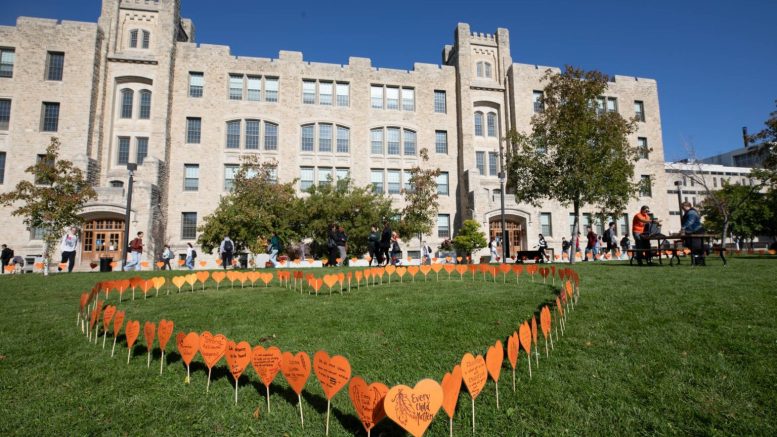In preparation of the National Day of Truth and Reconciliation, Denise Tardiff, the manager of Manitoba Collaborative Indigenous Education Blueprint collaborated with Kayla Lariviere, engagement lead for Indigenous Engagement and Communications, to create a heart garden at the Buller greenspace.
This year, the heart garden was decorated with 465 hearts, with each of the hearts planted with an offering of tobacco.
Tardiff said to UM Today that “it is to honour our relatives, the children who never came home from residential schools and their families that had their children taken from them and of course, survivors, who did make it home, but brought the legacy of residential schools with them.”
This is the second year in a row that the heart garden has been created within the university. Lariviere said, “we want to continue to grow it every year. We’ve had people taking photos, asking questions. I had someone come up to me and say, “thank you for doing this” so I think it’s having an impact.”
Each heart in the garden represents a person who attended residential schools and displays an empathetic message. “In memory of all the children taken. You are not forgotten. You matter. Every child matters,” reads one of the hearts.
Another one reads, “E’tasiw Mijua’jij Mekite’tasit,” meaning “every child matters” in Mi’kmaq.
The organizers hope that when folks notice this space, they could ask questions, get engaged and be more curious to learn more about reconciliation and what that means to them.
“We hope this space will be respected, and people will be cognizant of the footprint they’re leaving if they come and read these [hearts] and imagine what it would have been like for them to suddenly lose brothers, sisters, cousins, aunties, uncles and have that void in their life,” Tardiff said.
In addition, Tardiff said that “there is fear of saying the wrong thing, doing the wrong thing and it paralyzes folks. My message to them is do not let that stop you. If you don’t know what the best way to go about on Reconciliation actions, whether you’re making policy, programs or you’re a teacher and you have Indigenous students, humility is the key.”
Tardiff continued, “humility is one of our teachings and key values. When in doubt, have the humility to just ask. There is huge diversity in our Indigenous peoples, in our languages, in our practices, in our protocols. What works with one group may not necessarily work for another. Consult, listen, make plans, but always keep consulting.”



